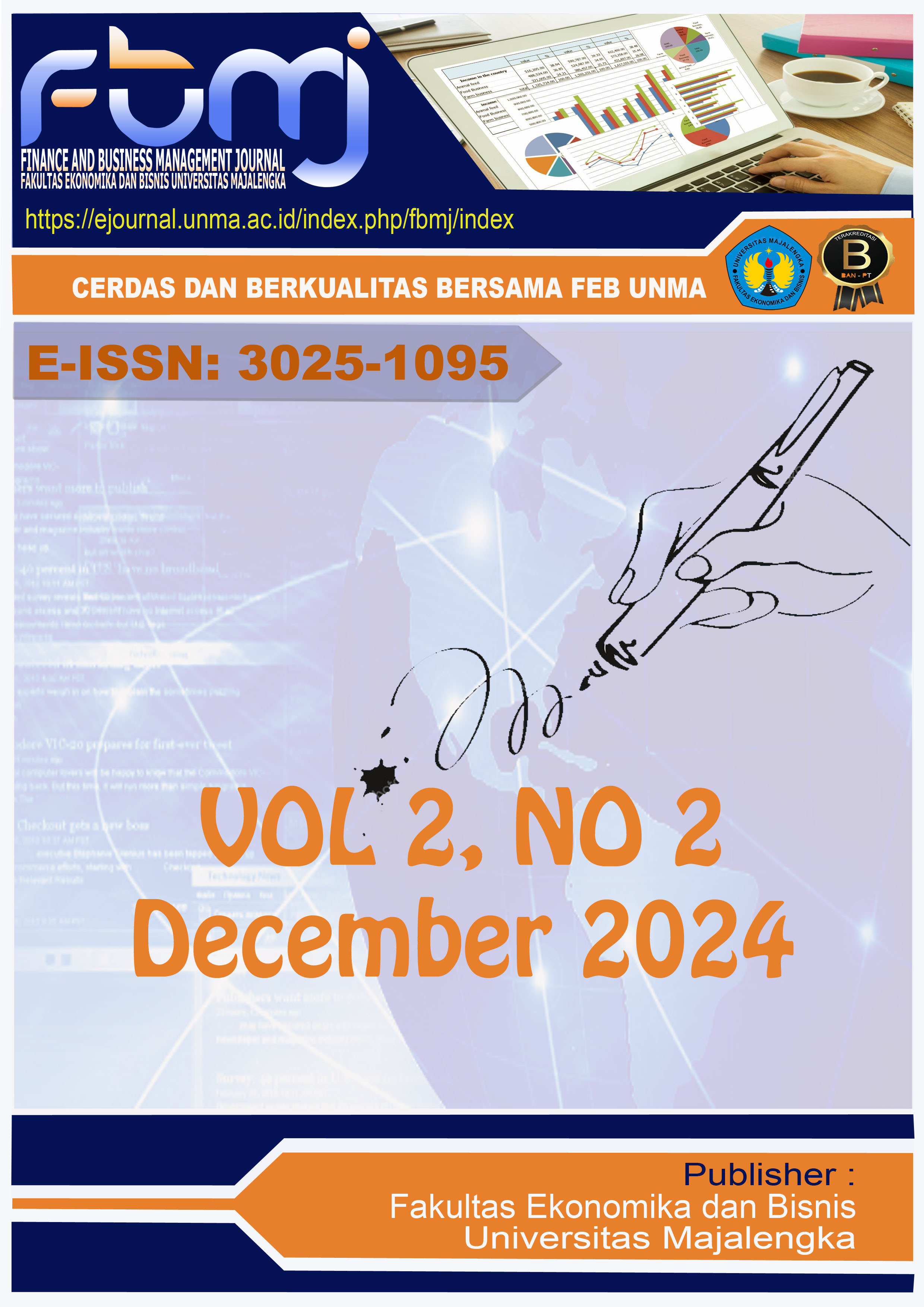The Effect of Emotional Value and Perceived System Quality on Recommendation Intention on Customer Online Travel Services
DOI:
https://doi.org/10.31949/fbmj.v2i2.12097Abstract
This study aims to identify the influence of emotional value and perceived system quality on recommendation intention in online travel services. In the competitive online travel industry, the ability to retain and increase customer loyalty relies heavily on the experience perceived by users. Emotional value, which includes positive feelings that arise during interactions with the service, as well as perceived system quality, which includes technical factors such as speed, ease of use, and platform reliability, are believed to have a significant influence on customers' intention to recommend the service to others. This study adopts a quantitative approach with a survey method of online travel service users who have interacted with the platform. Results from data analysis show that the emotional value perceived by customers has a positive and significant influence on recommendation intentions, while perceived system quality also plays an important role in strengthening this relationship. This research provides insights for online travel service managers to understand the factors that influence customer recommendation intentions and how they can be used to improve user experience and customer loyalty.
Keywords:
emotional value, system quality, recommendation intention, online travel serviceDownloads
References
Csikszentmihalyi, M. (1990). Flow: The Psychology of Optimal Experience. New York: Harper & Row.
Fishbein, M., & Ajzen, I. (1975). Belief, Attitude, Intention, and Behavior: An Introduction to Theory and Research. Addison-Wesley Publishing Company. https://books.google.co.id/books?id=8o0QAQAAIAAJ
Huang, L. (2016). Flow and social capital theory in online impulse buying. Journal of Business Research, 69((6),), 2277-2283. https://doi.org/doi:10.1016/j.jbusres.2015.12.042
Miles, J. A. (2012). Management and Organization Theory (first edit). Jossey-Bass.
Rintamäki, T., Kuusela, H., & Mitronen, L. (2017). Reconceptualizing customer value: A framework for capturing value from a customer perspective. Journal of Service Management, 18((5),), 556-570. https://doi.org/doi:10.1108/09564231710745001
Afiftama, I., & Nasir, M. (2024). The Effect of Brand Image, Brand Trust and Customer Experience on Brand Loyalty. Jurnal Ilmiah Manajemen Kesatuan, 12(1), 191–202. https://doi.org/10.37641/jimkes.v12i1.2403
Baron, C. (2024). Most popular online travel agencies among consumers in Indonesia as of June 2023. STATISTA.
Candri, F., Yacob, S., Junaidi, J., & Lubis, T. A. (2022). Customer loyalty model: a custom product perspective, innovation adaption, brand image, lifestyle, and trust in the interior furniture industry. Put It Right Journal, 1(1), 20–28. https://doi.org/10.22437/pirj.v1i1.17188
DAM, T. C. (2020). Influence of Brand Trust, Perceived Value on Brand Preference and Purchase Intention. Journal of Asian Finance, Economics and Business, 7(10), 939–947. https://doi.org/10.13106/jafeb.2020.vol7.no10.939
Dick, A. S., & Basu, K. (1994). Customer Loyalty: Toward an Integrated Conceptual Framework. Journal of the Academy of Marketing Science, 22(2), 99–113.
Dr. Munawaroh Zainal, S. E. , M. M. (n.d.). Manajemen Sumber Daya Manusia dalam Industri Pariwisata.
Farhani, S. N. (2022). Pengaruh Niat Beli terhadap Anteseden Pemasaran Media Sosial dengan Mediasi Pemasaran Media Sosial dan Loyalitas Merek sebagai Variabel Intervening pada Produk Maybelline (Vol. 01, Issue 03). https://journal.uii.ac.id/selma/index
Febriyanti, I., & Tuti, M. (2023). ASSURING CUSTOMER VALUE, CUSTOMER EXPERIENCE, AND TRUST TO IMPROVE CUSTOMER LOYALTY ARTICLE INFORMATION ABSTRACT. Jurnal Dinamika Manajemen Dan Bisnis, 6(2). http://journal.unj.ac.id/unj/index.php/jdmb
Garrett, J. J. (n.d.). The Elements of User Experience: User-Centered Design for the Web and Beyond. New Riders.
Indah Febriyanti, & Tuti, M. (2023). Assuring Customer Value, Customer Experience, and Trust to Improve Customer Loyalty. Jurnal Dinamika Manajemen Dan Bisnis, 6(2), 37–51. https://doi.org/10.21009/jdmb.06.2.3
Jopinus Saragih. (2023). The Influence of Service Quality and Trust in JNE Express Shipping Services for Loyalty Deli Serdang Consumers. International Journal of Economics (IJEC), 2(1), 1–9. https://doi.org/10.55299/ijec.v2i1.308
Kim, J., & Lennon, S. J. (2013). Effects of reputation and website quality on online consumers’ emotion, perceived risk and purchase intention: Based on the stimulus-organism-response model. Journal of Research in Interactive Marketing, 7(1), 33–56.
Maulidiyah, N. F. A., Singasatia, D., & Sunandar, M. A. (2022). Analisis Pengaruh User Experience Terhadap Kepuasan Pengguna Mobile Application VLive Menggunakan Model SCSI. MALCOM: Indonesian Journal of Machine Learning and Computer Science, 2(2), 28–34. https://doi.org/10.57152/malcom.v2i2.398
Mustafi, M. A. A., & Hosain, M. S. (2020). The role of online advertising on purchase intention of smartphones: mediating effects of flow experience and advertising value. Journal of Contemporary Marketing Science, 3(3), 385–410. https://doi.org/10.1108/jcmars-05-2020-0024
Nielsen, J. (1993). Usability Engineering. Morgan Kaufmann.
Norman, D. A. (2013). The Design of Everyday Things: Revised and Expanded Edition.
Oliver, R. L. (1980). A Cognitive Model of the Antecedents and Consequences of Satisfaction Decisions. Journal of Marketing Research, 17(4), 460–469.
Rofiq, A., Arifin, Z., & Wilopo. (2013). Pengaruh Penerapan Aida (Attention, Interest, Desire, Action) terhadap Keputusan Pembelian. Jurnal Administrasi Bisnis, 3(1), 1–10. https://www.neliti.com/id/publications/73894/pengaruh-penerapan-aida-attention-interest-desire-action-terhadap-keputusan-pemb
Rose, S., Clark, M., Samouel, P., & Hair, N. (2012). Online customer experience in e-retailing: An empirical model of antecedents and outcomes. Journal of Retailing, 88(2), 308–322.
Salma Luthfiyah Yulvi, & Mery Citra Sondari. (2023). Analisis User Experience Menggunakan HEART Framework dan Importance Performance Analysis (Studi Pada TikTok Shop). Indonesian Journal of Education And Computer Science, 1(3), 148–159. https://doi.org/10.60076/indotech.v1i3.245
Susanto, E. F., & Pandjaitan, D. R. H. (2024). The Effect of Trust on Customer Loyalty through Customer Satisfaction. Jurnal Ilmiah Manajemen Kesatuan, 12(1), 203–210. https://doi.org/10.37641/jimkes.v12i1.2404
Tiara, R., Ardhiyansyah, A., & Nugroho, S. S. (2022). The Influence of Social Network Attributes, Flows, Trust, and Electronic Word of Mouth on Social Network Users’ Purchase Intentions for Smart Phone Products in Indonesia. Proceedings of the International Conference on Economics, Management and Accounting (ICEMAC 2021), 207(January 2020), 329–338. https://doi.org/10.2991/aebmr.k.220204.036

Published
How to Cite
Issue
Section
License
Copyright (c) 2024 Farhan Muhammad Kamil Danopa, Nita Hernita

This work is licensed under a Creative Commons Attribution-ShareAlike 4.0 International License.
An author who publishes in the Finance and Business Management Journal agrees to the following terms:
- Author retains the copyright and grants the journal the right of first publication of the work simultaneously licensed under the Creative Commons Attribution-ShareAlike 4.0 License that allows others to share the work with an acknowledgment of the work's authorship and initial publication in this journal
- The author is able to enter into separate, additional contractual arrangements for the non-exclusive distribution of the journal's published version of the work (e.g., post it to an institutional repository or publish it in a book) with the acknowledgment of its initial publication in this journal.
- The author is permitted and encouraged to post his/her work online (e.g., in institutional repositories or on their website) prior to and during the submission process, as it can lead to productive exchanges, as well as earlier and greater citation of the published work













